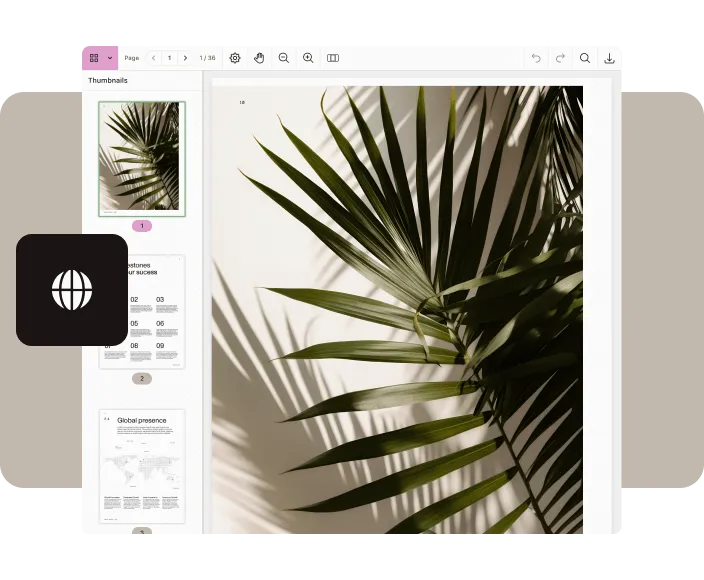JavaScript PDF library
Nutrient Web SDK is an enterprise-grade JavaScript library designed for viewing, annotating, and editing PDFs directly in web browsers. It offers a comprehensive set of features for working with PDF documents in web applications.
Latest release: Discover what’s new! Check out our changelog for the latest release updates.
Read more →Nutrient Copilot (preview): Be among the first to try our GitHub Copilot extension, tailored specifically for developers using Nutrient products. Built on top of GitHub Copilot, it integrates seamlessly with your favorite IDE and connects directly to Nutrient’s official documentation
Try now for free →Key capabilities
Build PDF solutions
Explore allFile type support
Nutrient Web SDK enables you to load, save, convert, and edit 15 different PDF, document, Office, and image file types.
Opening MS Office and image files requires the Office Files and Image Documents components to be enabled in your license.
- PDF/A
- PNG
- JPEG
- JPG
- TIFF
- TIF
- DOCX
- DOC
- DOTX
- DOCM
- XLSX
- XLS
- XLSM
- PPTX
- PPT
- PPTM
Browser support
Nutrient Web SDK is compatible with the latest versions of popular browsers, including Google Chrome, Mozilla Firefox, Safari, Microsoft Edge, and Firefox ESR. For a complete browser compatibility list, visit our browser support page.
Chrome
Firefox
Safari
Edge
Firefox ESR
Framework support
Nutrient Web SDK is compatible with all JavaScript frameworks, including React, Angular, Vue, Svelte, Electron, Ruby on Rails, and TypeScript. It just needs a DOM container to append the viewer, which is possible with any framework.
Operational modes
Nutrient Web SDK can run locally in the browser or work together with Document Engine — either self-hosted or managed — to offload document storing, rendering, and editing. See the full comparison between the two operational modes here.
Open and view PDFs
To load PDFs, use the load method, which takes a Configuration object as its parameter. This object specifies where the document is loaded on the page, the path to the source document, the license key, and more. For more information, see the guides on loading a document.
NutrientViewer.load({ container: "#pspdfkit", document: "source.pdf", licenseKey: "YOUR_LICENSE_KEY",});Integrate AI Assistant with Nutrient Web SDK
To integrate AI Assistant with Nutrient Web SDK, pass the AI Assistant configuration and a generated JSON Web Token (JWT) to NutrientViewer.load(). For more information, refer to our guide on AI Assistant integration with Nutrient Web SDK.
NutrientViewer.load({ aiAssistant: { sessionId: <sessionId>, jwt: <jwt>, backendUrl: <backendUrl>, }, ...});Create PDF annotations
Annotations can be created using annotation constructors and the Instance#create endpoint. This will return a promise that will resolve to created annotations with generated IDs set. Once annotations have been edited, they’ll need to be persisted. This is done by saving them. Save them to external storage or embed them into the document. They can also be exported to Instant JSON or XFDF. For more information, see our guide on creating PDF annotations using JavaScript.
const { List } = NutrientViewer.Immutable;const { DrawingPoint, Rect } = NutrientViewer.Geometry;const { InkAnnotation } = NutrientViewer.Annotations;
NutrientViewer.load(configuration).then(async (instance) => { var annotation = new InkAnnotation({ pageIndex: 0, boundingBox: new Rect({ width: 100, height: 100 }), lines: List([ List([ new DrawingPoint({ x: 0, y: 0 }), new DrawingPoint({ x: 100, y: 100 }), ]), ]), });
const [createdAnnotation] = await instance.create(annotation); console.log(createdAnnotation.id); // => '01BS964AM5Z01J9MKBK64F22BQ'});Add a text form field
To create a form field, first create the form element — also known as a widget annotation. Since the form field requires a widget annotation ID when it’s created, you’ll need to generate a unique ID for your widget annotation via PSPDFKit#generateInstantId(). For more information, see our guide on how to create fillable PDF forms.
// Create a new text form field.const widget = new NutrientViewer.Annotations.WidgetAnnotation({ id: NutrientViewer.generateInstantId(), pageIndex: 0, formFieldName: "MyFormField", boundingBox: new NutrientViewer.Geometry.Rect({ left: 100, top: 75, width: 200, height: 80, }),});const formField = new NutrientViewer.FormFields.TextFormField({ name: "MyFormField", annotationIds: new NutrientViewer.Immutable.List([widget.id]), value: "Text shown in the form field",});
instance.create([widget, formField]);Perform OCR on a document
Note: OCR is available when using Nutrient Web SDK with Document Engine. To perform optical character recognition (OCR) on a document, open the document from Document Engine and apply the performOcr document operation with Instance.applyOperations. For more information, see our guide on how to perform OCR.
await instance.applyOperations([ { type: "performOcr", language: "english", pageIndexes: "all" },]);Search and redact PDFs
To create redaction annotations based on specific search criteria, use NutrientViewer.Instance#createRedactionsBySearch(), which allows you to specify the search criteria, along with specifying a custom redaction annotation preset to be used when creating redactions based on search results. For more information, see our guide on searching and redacting PDFs.
const annotationIds = await instance.createRedactionsBySearch("PSPDFKit", { searchInAnnotations: false,});FAQ
Nutrient Web SDK is a powerful JavaScript PDF rendering engine that offers a customizable and responsive PDF viewer for web applications.
Nutrient Web SDK supports PDF, PDF/A, Word, Excel, PowerPoint, TIFF, PNG, and JPG file types for seamless viewing.
Yes, it’s fully compatible with all modern browsers and devices.
Absolutely! Adjust buttons, layouts, and the design to suit your application’s needs.
No, Nutrient Web SDK can run locally in the browser, eliminating the need for server dependency. If you want more enhanced functionalities, you can combine Nutrient Web SDK with Document Engine — either self-hosted or managed — to offload document storing, rendering, and editing from the browser, streaming only essential data to the web viewer.
Start your free trial for unlimited access and expert support.
